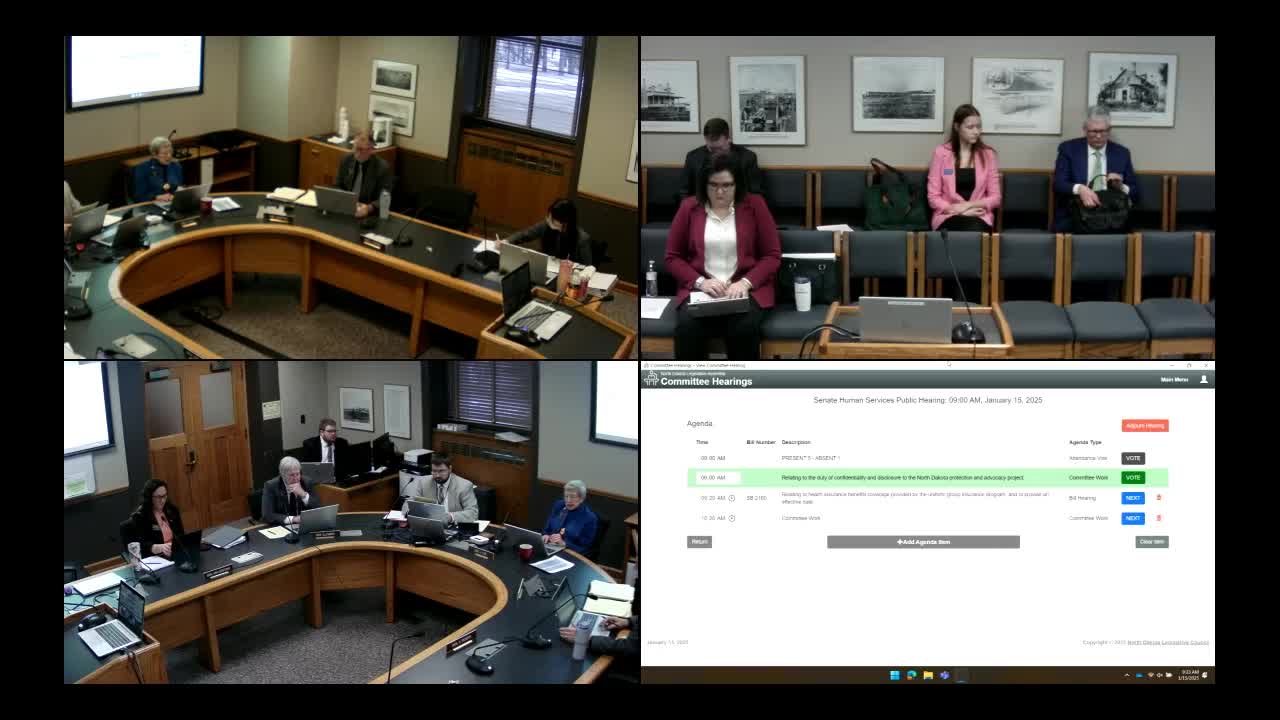Committee hears bill to move PERS health plan to non‑grandfathered ACA coverage; consultant estimates $26.35M biennial cost
Get AI-powered insights, summaries, and transcripts
Subscribe
Summary
The Senate Human Services Committee heard testimony on Senate Bill 2160, which would require the North Dakota PERS health plan to adopt ACA large‑employer mandated benefits by giving up grandfathered status.
The Senate Human Services Committee heard testimony on Senate Bill 2160, which would require the North Dakota Public Employees Retirement System (PERS) health insurance program for state employees and pre‑Medicare retirees to include Affordable Care Act (ACA) large‑employer mandated coverage by converting the state plan from grandfathered to non‑grandfathered status.
Rebecca Fricki, executive director of the North Dakota Public Employees Retirement System, testified in a neutral capacity and outlined likely changes and fiscal impacts. She told the committee the change would add ACA-required benefit provisions — including counting copayments toward out‑of‑pocket maximums, 100% coverage for preventive colonoscopies and contraception, additional well‑child coverage, tobacco cessation services, routine prenatal and postnatal care, breast pumps and lactation counseling — while the plan would try to retain benefits currently provided under the grandfathered plan (for example, infertility benefits and recently added prosthetic repair coverage).
Fricki cited a consultant estimate that converting the plan would increase premiums by about 3.9%, which she said corresponds to roughly $26,353,000 for the upcoming biennium: approximately $25,803,000 for the state portion and roughly $550,000 for non‑Medicare retirees. She noted non‑Medicare retirees pay 100% of their premium and would be responsible for any increase in that group’s premiums. The consultant attributed roughly 1 percentage point of the 3.9% estimate to increased utilization of newly mandated benefits.
Fricki also explained structural and regulatory consequences of giving up grandfathered status. Non‑grandfathered plans have fewer restrictions on plan design and premium changes; PERS’ tax counsel (Ice Miller) advised that some limits on how the plan may modify coverage or shift premium share to employees would be removed if the plan became non‑grandfathered. Fricki warned that splitting the state population into a non‑grandfathered state pool and a grandfathered political‑subdivision pool could change future premium rates for both groups depending on claims experience.
Crystal Bartuska of the North Dakota Insurance Department attended and explained that many private plans are self‑funded and therefore outside insurance department regulation; she briefed the committee on the practical distinctions among fully insured, self‑insured and faith/“Medi‑share” type arrangements and cautioned that not every bill’s protections will reach people covered under unregulated plans.
Committee members asked questions about historical PERS choices and the tradeoffs for employees: Fricki noted the state has historically funded benefits in order to maintain grandfathered status and that converting to a non‑grandfathered plan would provide enhanced consumer benefits but could permit future plan design and premium changes that would shift costs to employees.
No vote on SB2160 is recorded in the provided portion of the transcript. The committee closed testimony after the presentations and indicated it would consider the fiscal and structural implications further.
